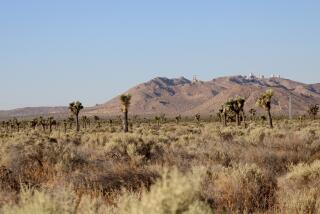A Symbol Displaced
- Share via
BARSTOW — The cross in the desert has survived assaults by the elements for 66 years since a prospector and his World War I comrades erected it to honor veterans. Local ranchers and miners resurrected it a half-dozen times after storms beat it down.
But it couldn’t weather a challenge under the 1st Amendment. The National Park Service has agreed to remove the 5-foot cross of metal pipe in the midst of the Mojave National Preserve after the American Civil Liberties Union threatened to sue, saying that it represents an illegal endorsement of religion on federal land.
“This is so unconstitutional you don’t even have to think about it,” said ACLU attorney Peter Eliasberg, whose group has successfully opposed other religious displays on public land.
To longtime desert dwellers who have maintained it for decades, and to the residents of the nearby Veterans Home of California in Barstow, however, the Mojave cross is a symbol of patriotism and a fixture of local culture as much as an icon of Christianity.
The cross, painted white, sits atop a mound of rocks in a starkly beautiful stretch of desert on Cima Road, south of Interstate 15 near the town of Baker. Surrounded by Joshua trees and silhouetted against rugged red hills, it occupies a site whose only amenities are the bright blue sky and vivid sunsets.
Many who know it well say the cross reminds them of the men and women who braved the horrors of war. It marks the military history of the desert, a key training ground for U.S. warriors who fought in European trenches and on Middle Eastern dunes.
And it serves as a gathering place where residents from as far away as Las Vegas have convened for Easter sunrise services, meetings, potlucks and picnics.
“It became a community institution,” said Bill Jackson, who served at nearby Ft. Irwin during the Korean War and now lives at the state-run Barstow veterans home. “But no one ever forgot that it was dedicated to all veterans.”
In 1934, local members of the Veterans of Foreign Wars mounted the cross and a memorial plaque atop a jumble of rocks in a stark expanse of desert. The plaque is gone. A boxcar that served as a meeting room for VFW members is a memory. The cross has remained, though, replaced each time it has fallen to weather or vandalism.
Neighbors across the far-flung region still look forward to the annual Easter gatherings at the cross. They serve up breakfast after Mass and, in the past, barbecued sides of beef to celebrate.
“Usually there are 30 to 35 people,” said Wanda Sandoz, 57. “I make cinnamon rolls; some girls make muffins. It’s often the only time of year that we see some of our neighbors.”
Her husband, 61-year-old Henry Sandoz, has replaced the cross several times over the last 20 years in honor of Riley Bembry, a prospector and WWI veteran who helped erect it.
“He was my good friend--one of my best friends,” Sandoz said. “It was his wish that it be put back up.”
Charles and Joan Booth stop at the site each time they travel to California from their home in Alaska. This year alone they’ve visited the cross five times.
“This is one of the prettiest spots that we’ve found,” said Charles Booth, 67. “We use the cross as a reference point. My wife recently mentioned it to a retired colonel as a place to camp.”
A nearby resident took offense at that spiritual symbol on secular land, though, and contacted the ACLU. The civil liberties group demanded that the National Park Service remove the Mojave cross and threatened to sue the agency for violating the 1st Amendment’s guarantee of religious freedom. The ACLU would not release the name of the complainant.
“If you or I were to go to the desert and put up a big sign saying ‘God is Dead’ or ‘Vote for Bush,’ [the Park Service] would say ‘No,’ ” Eliasberg said. “They are clearly favoring not only religion, but one particular religion.”
In an Oct. 20 letter, park service Regional Director John J. Reynolds reluctantly agreed to remove the cross “within the next few months,” but said, “We expect significant negative public and political reaction to removal of the cross.”
“It’s a cross on federal property . . . and the case law is pretty clear. We had no choice,” preserve Supt. Mary Martin told the Associated Press.
Civil libertarians have spurred similar moves across the country in recent years. In 1996, a federal appeals court ruled that a 51-foot public cross erected on city land in Eugene, Ore., dedicated as a war memorial and illuminated at city expense, “impermissibly breached the 1st Amendment’s ‘wall of separation’ between church and state.”
Also in 1996, a federal appeals court denied San Francisco’s claim that a 103-foot concrete cross built and illuminated at city expense was a significant historical monument. The court ordered the city to remove the display from public land. This year federal courts in Indiana and Kentucky barred the exhibition of stone tablets bearing the Ten Commandments in those states’ capitals.
Jackson, 71, wonders where these cases will lead. If the Mojave National Preserve must remove the cross, he asks, will military burial grounds be next?
Military cemeteries allow multiple religious symbols, Eliasberg noted. Similarly, the Mojave cross could remain if the area were opened to other permanent exhibits as a forum for free expression, the ACLU contends.
Jackson says he has no problem with that. But he argues that the cross is significant as more than a Christian symbol.
“It means so much to different people,” he said. “It’s not a religious sign as such. It’s just a place where we pause and reflect and take comfort.”
More to Read
Sign up for Essential California
The most important California stories and recommendations in your inbox every morning.
You may occasionally receive promotional content from the Los Angeles Times.










